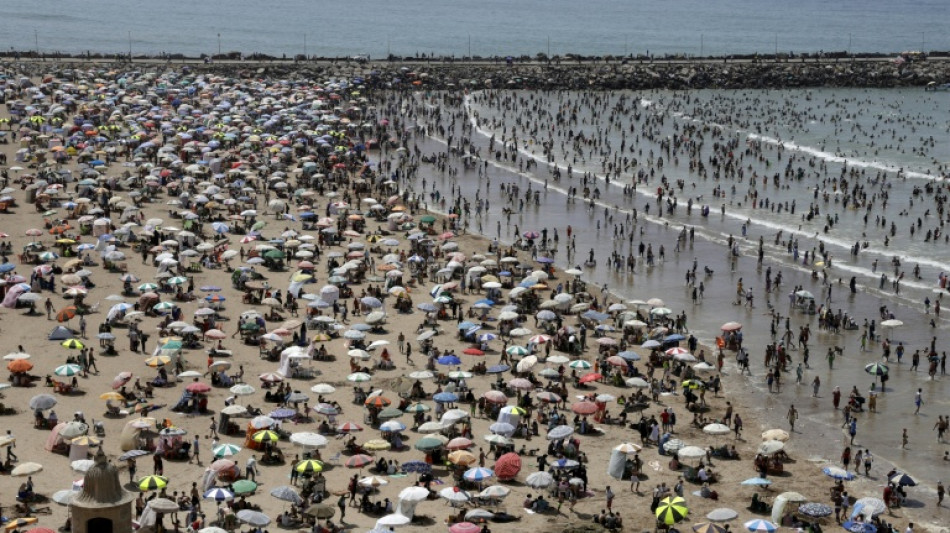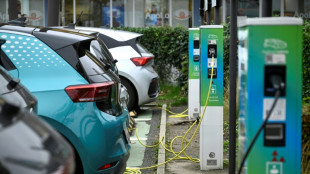
-
 Heart attack ends iconic French prop Atonio's career
Heart attack ends iconic French prop Atonio's career
-
SKorean chip giant SK hynix posts record operating profit for 2025

-
 Greenland's elite dogsled unit patrols desolate, icy Arctic
Greenland's elite dogsled unit patrols desolate, icy Arctic
-
Dutch tech giant ASML posts bumper profits, cuts jobs

-
 Musetti rues 'really painful' retirement after schooling Djokovic
Musetti rues 'really painful' retirement after schooling Djokovic
-
Russian volcano puts on display in latest eruption

-
 Thailand uses contraceptive vaccine to limit wild elephant births
Thailand uses contraceptive vaccine to limit wild elephant births
-
Djokovic gets lucky to join Pegula, Rybakina in Melbourne semi-finals

-
 Trump says to 'de-escalate' Minneapolis, as aide questions agents' 'protocol'
Trump says to 'de-escalate' Minneapolis, as aide questions agents' 'protocol'
-
'Extremely lucky' Djokovic into Melbourne semi-finals as Musetti retires

-
 'Animals in a zoo': Players back Gauff call for more privacy
'Animals in a zoo': Players back Gauff call for more privacy
-
Starmer heads to China to defend 'pragmatic' partnership

-
 Uganda's Quidditch players with global dreams
Uganda's Quidditch players with global dreams
-
'Hard to survive': Kyiv's elderly shiver after Russian attacks on power and heat

-
 South Korea's ex-first lady jailed for 20 months for taking bribes
South Korea's ex-first lady jailed for 20 months for taking bribes
-
Polish migrants return home to a changed country

-
 Dutch tech giant ASML posts bumper profits, eyes bright AI future
Dutch tech giant ASML posts bumper profits, eyes bright AI future
-
South Korea's ex-first lady jailed for 20 months for corruption

-
 Minnesota congresswoman unbowed after attacked with liquid
Minnesota congresswoman unbowed after attacked with liquid
-
Backlash as Australia kills dingoes after backpacker death

-
 Brazil declares acai a national fruit to ward off 'biopiracy'
Brazil declares acai a national fruit to ward off 'biopiracy'
-
Anisimova 'loses her mind' after Melbourne quarter-final exit

-
 Home hope Goggia on medal mission at Milan-Cortina Winter Olympics
Home hope Goggia on medal mission at Milan-Cortina Winter Olympics
-
Omar attacked in Minneapolis after Trump vows to 'de-escalate'

-
 Pistons escape Nuggets rally, Thunder roll Pelicans
Pistons escape Nuggets rally, Thunder roll Pelicans
-
Dominant Pegula sets up Australian Open semi-final against Rybakina

-
 'Animals in a zoo': Swiatek backs Gauff call for more privacy
'Animals in a zoo': Swiatek backs Gauff call for more privacy
-
Japan PM's tax giveaway roils markets and worries voters

-
 Amid Ukraine war fallout, fearful Chechen women seek escape route
Amid Ukraine war fallout, fearful Chechen women seek escape route
-
Rybakina surges into Melbourne semis as Djokovic takes centre stage

-
 Dollar struggles to recover from losses after Trump comments
Dollar struggles to recover from losses after Trump comments
-
Greenland blues to Delhi red carpet: EU finds solace in India

-
 Will the EU ban social media for children in 2026?
Will the EU ban social media for children in 2026?
-
Netherlands faces 'test case' climate verdict over Caribbean island

-
 Rybakina stuns Swiatek to reach Australian Open semi-finals
Rybakina stuns Swiatek to reach Australian Open semi-finals
-
US ouster of Maduro nightmare scenario for Kim: N. Korean ex-diplomat

-
 Svitolina credits mental health break for reaching Melbourne semis
Svitolina credits mental health break for reaching Melbourne semis
-
Japan's Olympic ice icons inspire new skating generation

-
 Safe nowhere: massacre at Mexico football field sows despair
Safe nowhere: massacre at Mexico football field sows despair
-
North Korea to soon unveil 'next-stage' nuclear plans, Kim says

-
 French ex-senator found guilty of drugging lawmaker
French ex-senator found guilty of drugging lawmaker
-
US Fed set to pause rate cuts as it defies Trump pressure

-
 Sleeping with one eye open: Venezuelans reel from US strikes
Sleeping with one eye open: Venezuelans reel from US strikes
-
Venezuela's acting president says US unfreezing sanctioned funds

-
 KPop Demon Hunters star to open Women's Asian Cup
KPop Demon Hunters star to open Women's Asian Cup
-
Trump warns of 'bad things' if Republicans lose midterms

-
 Russian strikes in Ukraine kill 12, target passenger train
Russian strikes in Ukraine kill 12, target passenger train
-
With Maduro gone, Venezuelan opposition figure gets back to work

-
 Celebrities call for action against US immigration raids
Celebrities call for action against US immigration raids
-
Rubio to warn Venezuela leader of Maduro's fate if defiant


As heatwaves intensify, Morocco ups effort to warn residents
Lhoussaine Youabd knows nearly all the languages spoken in Morocco, a useful skill in his role warning the population of growing climate-related risks in the country braving increasingly common heatwaves.
"Every time a weather alert is issued, I go on the media to warn Moroccans," Youabd, 52, a meteorological engineer at the national weather service, told AFP.
This has been his mission for the past decade, going on TV and radio stations to get the message across to as many Moroccans as possible, particularly in remote rural areas.
Youabd said villagers are "happy that we speak their language" -- dialects of colloquial Arabic or those used by the Amazigh -- when issuing updates, warnings and recommendations that could be life-saving.
The General Directorate of Meteorology (DGM) has recently declared 2024 Morocco's hottest year on record while registering an average rainfall deficit of -24.7 percent, on the North African country's seventh straight year of drought.
In late June this year, as a deadly heatwave affected large areas of southern Europe -- across the Mediterranean from Morocco -- the DGM said several cities broke their temperature records for that month.
Displaying a weather forecast map mostly shaded in intense red, Meriem Alaouri, the interim head of the national weather service in Casablanca, said that the upcoming summer months are expected to be even hotter than usual.
Scientists say that recurring heatwaves are a clear marker of global warming and that they are set to become more frequent, longer and more intense.
Fuelled by human-driven climate change, 2024 was the warmest year on record globally -- and 2025 is projected to rank among the top three.
When extreme weather events hit, like heatwaves, storms or floods, Moroccan authorities issue colour-coded warning bulletins that are transmitted by the civil defence and media outlets.
Youabd said that in recent years, text messages are also used to alert local officials across the country, who can then notify residents in their area.
The DGM has also expanded its social media presence, using networks like Facebook and LinkedIn to get the message across, and a "Smart Alert" that would land directly in Moroccans' mobile phones is currently being developed, he said.
- No power -
Hicham Fenniri, director of the International Water Research Institute at Mohammed VI Polytechnic University, said it was important to ensure local, regional and national leaders and decision-makers are well informed about climate risks.
In remote areas, connecting residents to the electricity grid is crucial to make sure they can "access information" and install air conditioning systems, he said.
Traditional houses "but remade using clean science and technology" can help reduce some effects of the intense heat, along with ensuring access to potable water to mitigate dehydration risks.
In 2024, authorities said that 5.4 percent of Moroccans living in rural areas did not have access to electricity, and 20.4 percent had no reliable source of clean water.
Ben Achir Chekroun, a 66-year-old pensioner from Harhoura, south of the capital Rabat, said that the weather alerts were easy to follow.
"We get the information either from the radio, on online media and in newspapers," he told AFP.
Loubna Rouhi, head physician at the local medical centre in Harhoura, said that in the scorching heat, it was recommended to stay in the shade and avoid going outside during the hottest hours, between 10 am and 4 pm, as well as wearing light clothes and staying hydrated.
The 48-year-old doctor said that she has used health ministry notices to help inform the population about the risks of extreme heat.
One recent campaign launched by the ministry aims to warn against scorpions and snakes, which are far more active in the heat.
Mohammed Esmaili, a senior health ministry official, said that a specialised medical kit has "helped significantly reduce mortality" linked to scorpion or snake bites, from 7.2 percent of cases in 2013 down to 1.2 percent.
S.Gantenbein--VB



